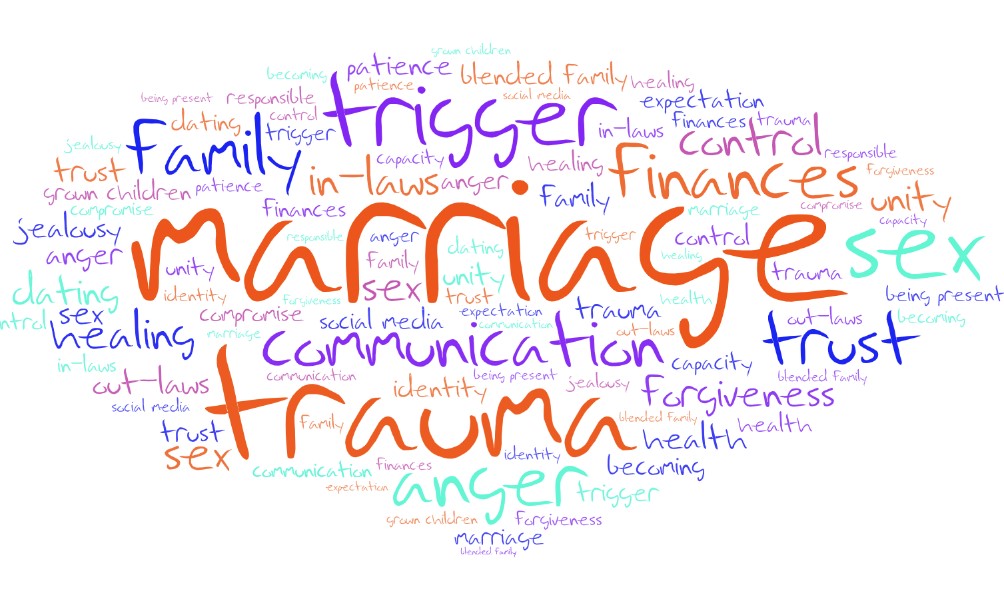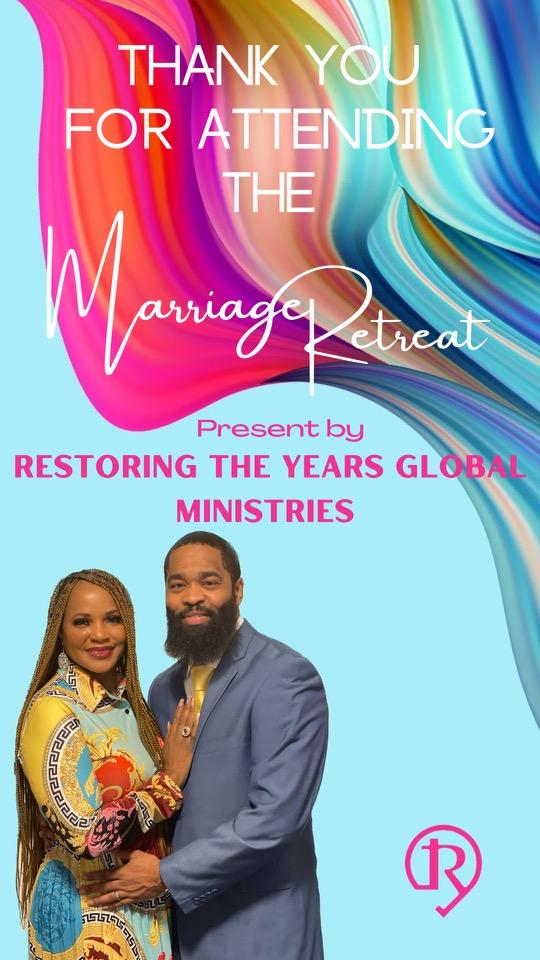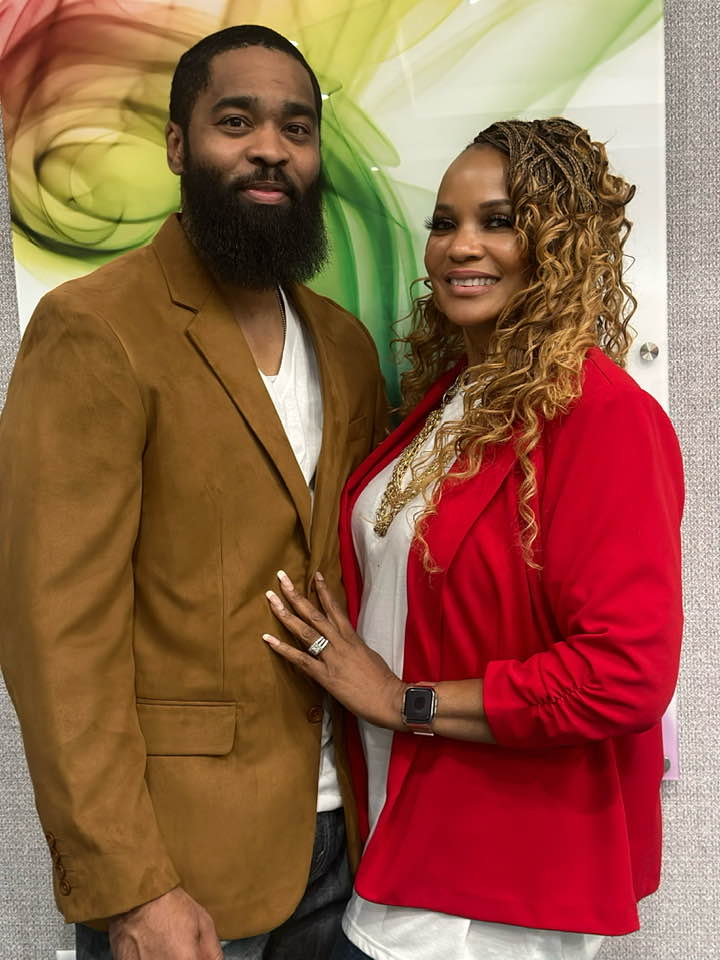RTYGM 2023 Marriage Retreat Recap
Hosted by Pastors Nick and Rhonda Travitt


…the true meaning of love in a marriage…
“Your love is unconditional. It’s all-inclusive as you accept the positive and the negative aspects of your mate.”
Marraiage Retreat Recap
As we come to the end of this enriching marriage retreat, we reflect on the invaluable insights and strategies that we’ve gained. We’ve delved deep into the complexities of building and maintaining a strong marriage, and we’ve emerged with a newfound appreciation for the power of effective communication, intentional acts of love, and nurturing our emotional connections. With these powerful tools in our arsenal, we feel empowered to continue strengthening our relationships and building a love that lasts.
We’ve had the pleasure of connecting with other couples who share our passion for nurturing and strengthening their marriages. Through engaging sessions led by expert facilitators, Pastors Nick and Rhonda Travitt, and meaningful exercises that challenged us to be vulnerable and open with our partners, we’ve gained a greater understanding of what it takes to build a lasting bond. We leave this retreat with a renewed commitment to our marriages and a sense of hope and excitement for the future.
Our Speakers Pastor Nick & Rhonda Travitt
As a husband and wife duo, we bring a unique blend of perspectives and insights to this marriage retreat. Over 14 of marriage, we’ve experienced the joys and challenges of building a strong and lasting partnership. Through our own journey, we’ve learned valuable lessons and developed strategies for deepening our connection and weathering life’s storms together. As speakers at this retreat, we’re passionate about sharing our expertise with other couples who are looking to do the same. We believe that a successful marriage requires both love and a willingness to learn and grow together, and we’re excited to help others create a love that lasts a lifetime. Our sessions will be engaging, thought-provoking, and designed to help couples build strong, healthy, and fulfilling relationships. We can’t wait to meet you and share in this journey of growth and discovery. – Pastor Nick and Rhonda Travitt
WOMEN –
Did you date potential …
hoping for a promise?
MEN –
Did you marry the shape …
hoping for substance?
QUOTE:
“Consideration can kill a marriage”
What Retreat Attendees Had To Say
The Top 4 Takeaways from our 2023 Marriage Retreat
“After you’ve exhausted all means, give it one more try” suggests that when a relationship faces significant challenges and all efforts to resolve them seem to have been tried and tested, it may still be worth making one final attempt before considering other options.
- Commitment and perseverance: Marriages often require a significant level of commitment and perseverance to weather difficulties. The statement encourages couples to reflect on their commitment to the relationship and consider giving it one more shot, even when it seems like all options have been explored. It emphasizes the importance of not giving up prematurely and being willing to invest additional effort and energy into trying to salvage the relationship.
- Reflection and self-awareness: Before giving it one more shot, it’s crucial for both partners to engage in deep reflection and self-awareness. This involves introspecting one’s own contribution to the problems within the marriage and being willing to take responsibility for one’s actions. Honest self-reflection can help identify areas for personal growth and change, which can positively impact relationship dynamics.
- Open and honest communication: Giving the marriage one more shot requires open and honest communication between partners. This means being vulnerable, expressing feelings, and actively listening to one another. It involves discussing concerns, desires, and expectations while maintaining empathy and respect for each other’s perspectives. Effective communication can foster understanding and pave the way for finding common ground or exploring potential solutions.
- Willingness to change and compromise: Making one more effort in a troubled marriage often necessitates a willingness to change and compromise. Both partners need to assess their behaviors, attitudes, and expectations, and be open to making necessary adjustments. This may involve letting go of rigid beliefs, practicing forgiveness, and finding new ways to meet each other’s needs. It requires a genuine commitment to personal growth and an active effort to create positive change within the relationship.
- Time and patience: Healing a troubled marriage takes time and patience. Giving it one more shot implies being willing to invest time in rebuilding the relationship and acknowledging that change may not happen overnight. It requires a long-term perspective and a belief that, with continued effort and dedication, the relationship has the potential to improve.
“Deal with the capacity of who you married; not their potential or the lack thereof” suggests that in a marriage or committed relationship, it is important to accept and work with the abilities, strengths, and limitations of your partner as they currently are, rather than holding onto unrealistic expectations based on their potential or focusing solely on their perceived shortcomings.
- Acceptance and realistic expectations: Every individual has their own unique set of abilities, talents, and limitations. When it comes to a committed relationship, it is important to accept your partner for who they are, recognizing their current capacity rather than expecting them to change or fulfill some imagined potential. Realistic expectations help foster understanding and minimize disappointment.
- Appreciation for strengths: Each person brings their own strengths and qualities into a relationship. By focusing on and appreciating the existing capabilities and positive aspects of your partner, you can nurture a sense of gratitude and create a foundation of support and encouragement. Recognizing and valuing their strengths can contribute to a healthier and more fulfilling relationship.
- Effective communication and collaboration: When you deal with your partner’s capacity rather than their potential, it encourages open and honest communication about each other’s abilities, needs, and limitations. By understanding and respecting each other’s capacities, you can work together more effectively, dividing tasks and responsibilities in a way that aligns with both partners’ abilities and promotes mutual growth.
- Managing expectations: Holding onto unrealistic expectations can place unnecessary strain on a relationship. It is essential to have a clear understanding of what your partner is capable of and to communicate openly about your own limitations as well. By managing expectations and adapting to each other’s capacities, you can reduce conflict and create a more harmonious partnership.
- Supporting personal growth: While it is important to deal with your partner’s current capacity, it does not mean disregarding personal growth and improvement. Encouraging and supporting each other’s development can be a positive aspect of a relationship. However, it is crucial to approach personal growth as a collaborative effort rather than imposing expectations or demands based on potential.
- Embracing individuality: Each person in a relationship has their own unique qualities and abilities. Embracing and respecting your partner’s individuality can create a foundation of acceptance and understanding. By acknowledging and appreciating their capacity, you can foster an environment where both partners feel valued for who they are.
“Recalibrate your grace” urges you to reflect on how you extend forgiveness, kindness, and compassion to yourself and others. It emphasizes the importance of finding a balance, setting healthy boundaries, cultivating empathy, and practicing self-care. By recalibrating your grace, you can promote personal growth, enhance your relationships, and foster a more compassionate and understanding approach to life.
- Self-reflection: Recalibrating your grace begins with self-reflection. It involves taking a closer look at how you extend forgiveness and kindness to yourself. Are you overly critical or judgmental? Do you hold onto past mistakes or shortcomings? Self-reflection helps you recognize areas where you may need to recalibrate your grace by offering yourself more compassion, understanding, and forgiveness.
- Extending grace to others: Recalibrating your grace also involves considering how you interact with others. Are you quick to judge or hold grudges? Do you give others the benefit of the doubt? Evaluating your approach to forgiveness and compassion allows you to adjust your perspective and extend grace to others in a more balanced and empathetic manner.
- Setting healthy boundaries: Recalibrating your grace is not about being a doormat or allowing others to take advantage of your kindness. It is about finding a balance between offering grace and maintaining healthy boundaries. Sometimes, recalibrating your grace means recognizing when it’s necessary to assert yourself, say no, or distance yourself from toxic relationships.
- Cultivating empathy: Recalibrating your grace often involves cultivating empathy—a willingness to understand and connect with others on an emotional level. Empathy allows you to see things from different perspectives and respond with compassion, even when someone’s actions or words may have hurt you. By actively practicing empathy, you can recalibrate your grace to be more inclusive and understanding.
- Practicing self-care: Recalibrating your grace also means recognizing your own needs and practicing self-care. It’s important to prioritize your own well-being and set boundaries to prevent burnout or resentment. By taking care of yourself, you can maintain a healthy balance between extending grace to others and preserving your own emotional and mental health.
- Continual growth and learning: Recalibrating your grace is an ongoing process. It requires a commitment to personal growth and learning. As you encounter new experiences and challenges, you may discover areas where your grace could be expanded or refined. Remaining open to growth and being willing to adjust your approach allows you to continually recalibrate your grace in a way that aligns with your values and promotes healthy relationships.



